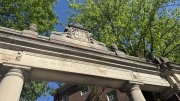 |
| Military physicians (left to right) Eldon Bell, Miguel Palos, Robert Yarrish, and (below) Graham Hoffman |
| Courtesy of Miguel Palos |
 |
| Courtesy of Graham Hoffman |
A navy reservist for more than 20 years, Miguel M. Palos ’76, M.D. (at left, center), writes, “Having been activated for Desert Storm I didn’t expect to be deployed again. Yet, here I am at Camp Arifjan, Kuwait, supporting Operation Iraqi Freedom with the Expeditionary Medical Force, Fleet Hospital Dallas. As I am only one of two military radiologists in Iraq and Kuwait, it seems that Harvard is representing 50 percent of the force.” The area chair for the College’s admissions committee in California’s San Gabriel Valley, Palos was mobilized “just before our ranking meeting for the high-school students. My wife, Claudia, and Jonathan Baskin ’61 carried on. I may start a local club, but haven’t lined up any speakers to enjoy the sun, sand, and wind. Also, with no alcohol, the cocktail hour would be dry.” Joining him are (far left) Capt. Eldon E. Bell, M.P.H. '63, M.D., and Cdr. Robert L. Yarrish ’70, M.D. Palos reports that Bell, after a long career in the State Department, “was willing to leave behind retirement, his wife, Georgianna, and their home in Rapid City, South Dakota,” to be part of the army’s internal-medicine department. “He may be the oldest current active-duty colonel in the army.” Seven-year navy reservist Yarrish “left behind a hospital practice in New Rochelle, New York, and his wife, Lynda,” to become a “department of one in infectious diseases,” heading internal medicine for the fleet hospital. “Returning home to Monrovia without my M-16 and 9mm,” Palos adds, “will be a change and not necessarily for the better. I must admit that patients seem to pay closer attention to ‘doctor’s orders’ not knowing if I am reaching for a pen or my sidearm.”
Psychiatrist Graham W. Hoffman ’78 (left, serving as medic on a civil-affairs patrol to renovate six schools near Samarra) joined the Army Reserve after September 11 and has completed his second tour in Iraq, “treating mostly 20-something First Infantry Division soldiers (and some Iraqis, too) for post traumatic stress disorder. The Iraqi civilians were very nice to us again, even though Samarra had a lot of insurgents for much of my time there. And the kids love us, especially the little girls, who seem to feel all this democratic change will be good for them in particular. The whole ‘mission’ is starting to feel like Peace Corps work, albeit you still have to be well armed. I am a political left-winger on most things, but on the Middle East business I think we are doing the right thing, mainly because that’s what all these Iraqi civilians kept telling me. Not sure why you don’t hear that kind of stuff on the media, except that most civilians there would consider it suicide to say good things about Americans on-camera.”





